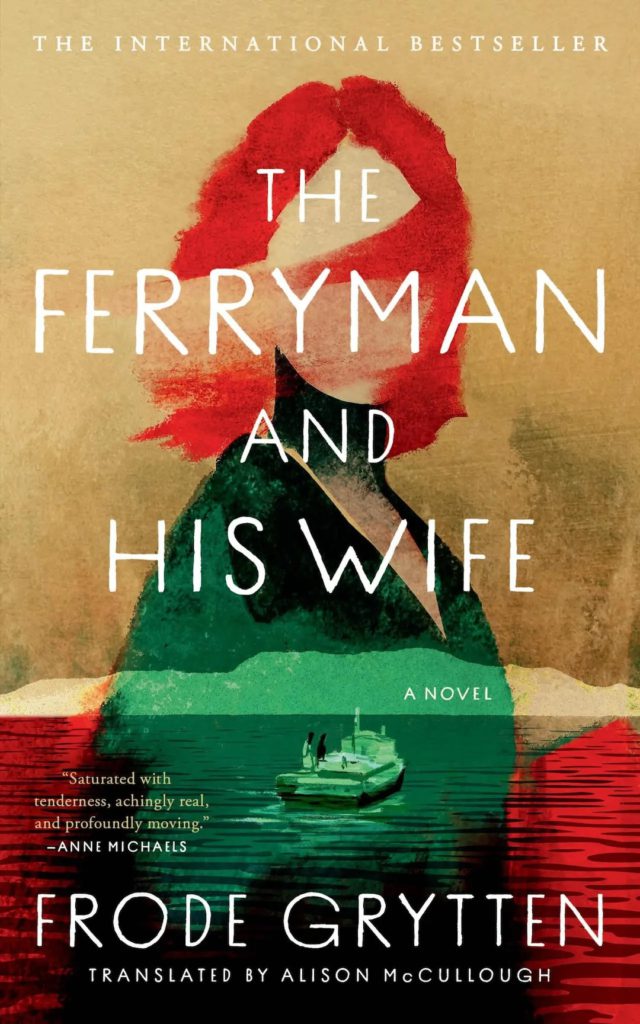
November 18 is the last day of Nils Vik’s life. And, for his final act, the elderly ferryman boards his boat and navigates the fjord, as he has done on so many other days. This time, though, he is joined by his dearly departed, yet still trusty, dog. As he travels the waters that he knows so well, Vik encounters a legion of passengers who, like his dog, have already died. As memories and revelations of his life rise to the surface, Vik awaits the one person with whom he wants to reunite, his late wife.
The latest novel from Norwegian author Frode Grytten, The Ferryman and His Wife is also his first to be translated into English. In Norway, Den Dagen Nils Vik døde (English: The Day That Nils Vik Died, according to Wikipedia) was released two years ago and went on to win the country’s prestigious Brage Prize. The U.S. edition, translated by Alison McCullough, came out just last week and it’s a must-read.
The Ferryman and His Wife is compelling from the opening line, in much the same way that The Stranger and One Hundred Years of Solitude are. “At a quarter past five in the morning Nils Vik opened his eyes, and the last day of his life began,” is the sort of sentence that says much of what you need to know about the novel. It’s the sort of sentence that can be dissected in college literature classes, subjected to essays on metaphor and liminal space and prompt weird AI overviews of the themes on Google. (Eh, the last one has already happened.)
Grytten takes the concept of life flashing before one’s eyes and puts into a mythological context, with the fjord functioning more or less like the River Styx, as a border between the living and the dead. The characters that he encounters were, at some point or another in their life, his passengers. Some died young, others in old age. Some stories end quite tragically, others are far more ordinary.
There’s a lot packed into this relatively short book, but there are two things I pulled out from my first ready of The Ferryman and His Wife. The first is that there’s a sort of clarity that exists in the between-spaces, whether that’s the pre-dawn morning or an inlet or the end of life.
In the fjord heading out to sea, as Nils inches closer to death, it becomes more obvious that everyone is connected. Some of the passengers were, at one point, friends. Others he knew only briefly. Regardless, their stories are all intertwined with his to varying degrees.
I do think the title of the novel is somewhat misleading. While I can see why The Ferryman and His Wife might be more palpable to U.S. readers than The Day That Nils Vik Died, it’s not entirely a book about one relationship. It’s also about Nils’ ties to his family and his community and, really, how all these interactions shaped the person he would become by the time of his death. So, the other big takeaway from the novel is that we’re all connected. It really doesn’t matter how fleeting our acquaintances are, they often can, and do, make an impact.
There’s a lot of depth to The Ferryman and His Wife, but it’s also a relatively quick read. It’s not long and it’s written (and translated) in an accessible way. Definitely get yourself a copy or check it out from a library. Maybe request it if your local library doesn’t have a copy. It’s really worth the read and I, for one, would love to read Grytten’s other books, especially since I’ve read that he has referenced The Smiths in other works and wrote a novel about The Clash.
Liz O. is an L.A.-based writer and DJ. Follow on Instagram or sign up for the weekly, Beatique newsletter for updates on new stories and gigs.
Keep Reading:
Simon Raymonde Talks Cocteau Twins and New Book, In One Ear (Interview)
‘Ballad of Buttery Cake Ass’ Author Aug Stone Releases New Single of His Own (Interview)